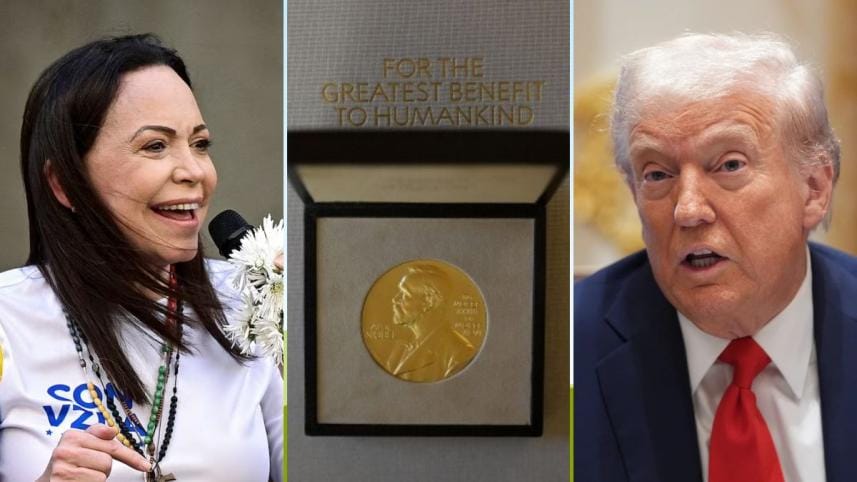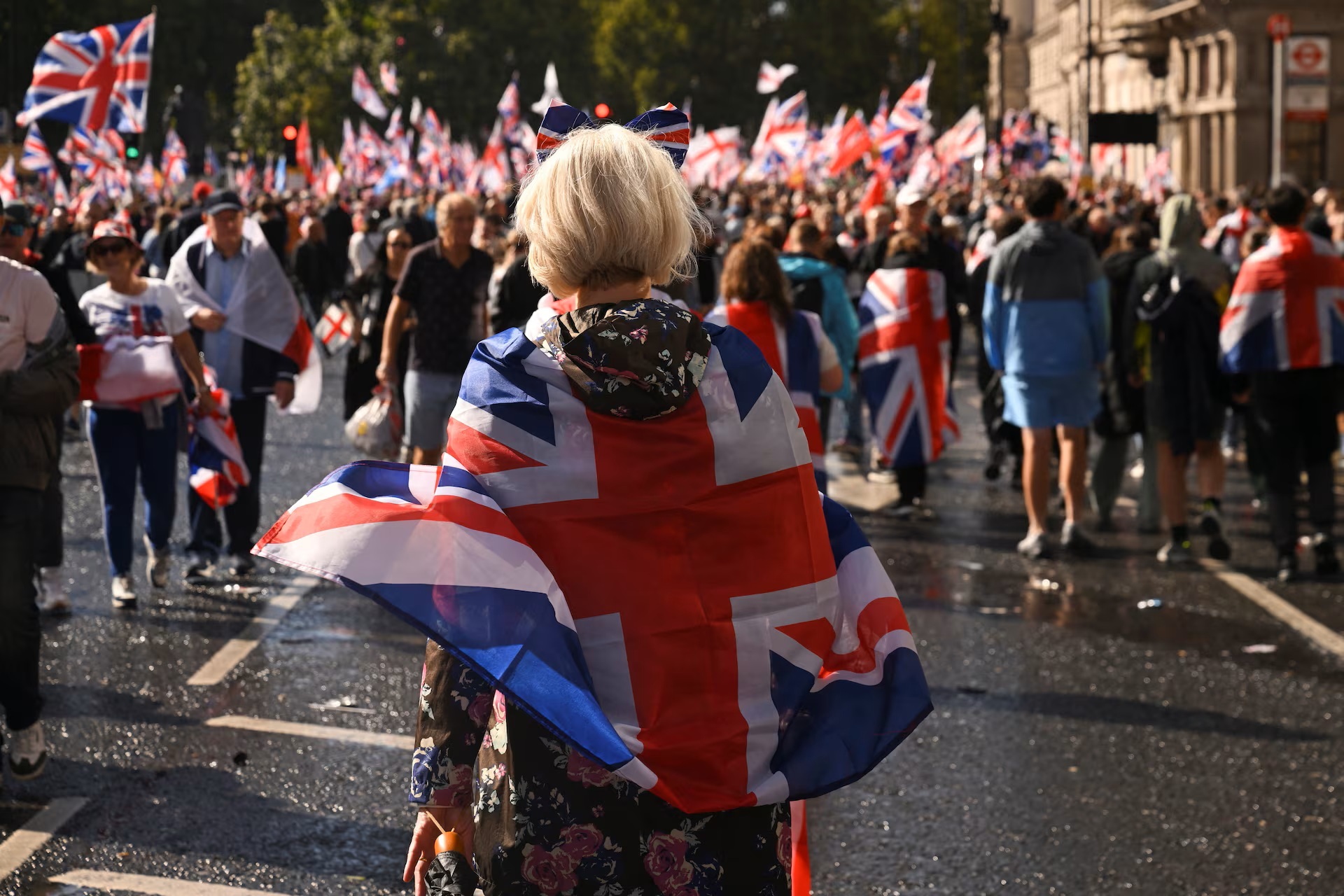Nobel Peace Prize: The politics of peace, sponsored by the powerful

Once upon a time, peace used to be noisy. It marched through the streets, shouted through megaphones, and dared to disturb those who mistook silence for stability. Gandhi did not fast for brand partnerships. Martin Luther King Jr did not ask his oppressors to like and subscribe. But in 2025, peace has found a new aesthetic: carefully worded, media-trained, and proudly retweeted by the very people it is supposed to hold accountable.
This year, the Nobel Peace Prize went to Venezuelan opposition leader María Corina Machado for her "tireless work promoting democratic rights." It sounds noble enough—until she thanked US President Donald Trump for his "decisive support." The same Trump who once tried to deploy the National Guard against his own citizens and dismantled USAID under the spiritual guidance of Elon Musk. Apparently, world peace is now part of his portfolio, somewhere between space tourism and meme posting.
The irony here is not subtle. In the same breath that the White House accused the Nobel Committee of "placing politics over peace," Machado graciously dedicated her prize to a man whose presidency was practically a four-year war on empathy. One could almost hear Alfred Nobel rolling in his grave, whispering, "This isn't quite what I meant by peace."
Trump, of course, responded with the self-restraint of a toddler denied dessert. He congratulated Machado, reposted her praise, and then declared that the Nobel Prize had "lost credibility." Which, to be fair, might be the first time Trump has ever been right by accident. Because if peace prizes are now handed out like influencer collaborations—complete with cross-platform gratitude and mutual back-patting—then credibility is not the only thing that has been lost.
Let's pause to admire the absurdity. Russia's Vladimir Putin, not usually known for his love of peaceful resolutions, praised Trump for "doing a lot to resolve complex crises." Israel's Benjamin Netanyahu chimed in too, hailing Trump as a global peacemaker. When the planet's most conflict-committed leaders start agreeing on who deserves a peace prize, one begins to wonder whether "peace" has been redefined to mean "PR coordination between autocrats."
This is not the first time the Nobel Committee has found itself tangled in contradictions. Obama's 2009 win for "promoting dialogue" came just months before he authorised drone strikes that did quite the opposite. But at least Obama did not dedicate his award to George W Bush. Machado's decision to thank Trump feels like the diplomatic equivalent of applauding your arsonist for keeping the fire warm.
It's not that she is undeserving of recognition; Venezuela's struggle for democracy is real, brutal, and courageous. But the optics of praising a man cheered on by Netanyahu and Putin make the whole ceremony feel less like a celebration of courage and more like a LinkedIn endorsement exchange.
Even the Nobel Committee's citation sounded as if it had been drafted by ChatGPT on polite mode: "For tireless work promoting democratic rights." You could slap that line on half the world's think tanks and three-quarters of its hypocrites. It is the kind of praise that means everything and nothing, the award equivalent of a participation trophy at the apocalypse.
Meanwhile, Trump continues his second term, still auditioning for "Most Improved Peacemaker." His administration, armed with slogans and surrounded by billionaire-turned-advisers, has reshaped global diplomacy into a corporate strategy deck. Peace, to him, is no longer a value but a deliverable, preferably one announced two days before Nobel nominations close.
And the Nobel Committee? It seems caught between nostalgia and naivety. It wants relevance in a world where activism has been rebranded as content creation. But in trying to stay modern, it has started mistaking visibility for virtue. It is no longer about who risked their life for peace; it is about who can fit "peace" into a trending hashtag without losing their donor base.
Perhaps the real tragedy is not that Trump did not win, or that Machado did—it is that the award itself has stopped meaning anything beyond optics. When activists must thank their benefactors, and world leaders must feign enlightenment for applause, peace becomes performance art. And the Nobel stage, once sacred, now looks suspiciously like a red carpet, complete with moral sponsorships and ideological brand deals.
There was a time when peace prizes embarrassed the powerful—when they provoked, irritated, and disrupted. Today, they flatter. They've gone from defiant to diplomatic, from firebrand to photo op. The new age of peace is not about ending wars; it is about editing them for prime time.
Maybe the Nobel Committee should be honest and update the prize categories: "Best Supporting Role in a Ceasefire." "Outstanding Achievement in Selective Outrage." "Lifetime Contribution to the Illusion of Global Stability." That way, at least the rest of us would know what we're applauding.
Because peace, the real kind, is not polite. It does not thank its sponsors. It does not survive on applause from Netanyahu or compliments from Putin. It does not dedicate its victories to men who once bragged about building walls.
The truth is simple: when peace starts needing permission from the powerful, it stops being peace. It becomes PR—a beautifully packaged illusion, complete with hashtags, handshakes, and a trophy for whoever looks best holding it.
Barrister Noshin Nawal is a columnist for The Daily Star. She can be reached at nawalnoshin1@gmail.com.
Views expressed in this article are the author's own.
Follow The Daily Star Opinion on Facebook for the latest opinions, commentaries, and analyses by experts and professionals. To contribute your article or letter to The Daily Star Opinion, see our guidelines for submission.




 For all latest news, follow The Daily Star's Google News channel.
For all latest news, follow The Daily Star's Google News channel. 
Comments